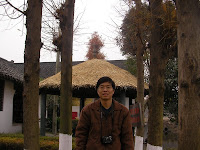The next residence belonged to a person called Zhang Wentian. Zhang Wentian 张闻天 was Vice Minister of Foreign Affairs of the People's Republic of China from December, 1954 to November, 1960. Entrance to this residence is free of charged. It is opened to public. The only thing that visitors are not allowed to do according to the guard in front I met was smoking. Smoking is not allowed.
Front door of this residence
It is a single storey building that is styled in the old Chinese large family building. There is an open courtyard and filled with rooms for the family members.Inside the building was displays of Zhang Wentian's life history and achivements. A native of Pudong Shanghai, Zhang joined the CPC in 1925 and was sent to study at Moscow Sun Yat-sen University in Moscow, which was set up under Kuomintang's founder Sun Yat-sen's policy of alliance between the Soviet Union and CPC to train Chinese revolutionaries and named after him. It was there Zhang came to know Wang Ming and play an active role in the following group 28 Bolsheviks.
Photo and biography of Zhang Wentian


After the end of Chinese anti-Japanese War, Zhang was sent to Manchuria with Lin Biao, Gao Gang and Chen Yun to set up a base for CPC resistance to Kuomintang.
After the establishment of the People's Republic of China, he became the Chinese Ambassador to Soviet Union and Under Secretary of the Foreign Ministry. He was disgraced in the LuShan Meeting in 1959 because he criticized Mao Zedong's Great Leap Forward. Zhang and Defence Minister Peng Dehuai, Chief of Staff Huang Kecheng and CPC General Secretary of Hunan Province Zhou Xiaozhou were labeled as an anti-CPC group and stripped of CPC membership.
After the establishment of the People's Republic of China, he became the Chinese Ambassador to Soviet Union and Under Secretary of the Foreign Ministry. He was disgraced in the LuShan Meeting in 1959 because he criticized Mao Zedong's Great Leap Forward. Zhang and Defence Minister Peng Dehuai, Chief of Staff Huang Kecheng and CPC General Secretary of Hunan Province Zhou Xiaozhou were labeled as an anti-CPC group and stripped of CPC membership.




Kitchen stove and tables that the family members have their meals. The stove is quite unique as seen in the photos below.
Could this vegetable patch has existed in the old days when Zhang Wentian and family still lives here? Maybe they were living off the land given that this residence is situated in the outskirt of Pudong area. Farming should have been the trade during those days.
After exploring the front part and inner part of the residence, we went behind the residence and found more interesting view. There were a round of trees planted in straight parallel lines. Quite a bit like the winter sonata formation. The base portion of the tree trunks are painted white so that at night light shine from vehicle could help driver avoid driving into them. However, these are not beside the road, so I wonder that it is for?
Neighbours even has tangerine trees across the stream
Zhang did not survive the persecution of the Cultural Revolution and died in 1976 in exile. He wrote to Mao asked permission to go to Beijing for Medical treatment while he had heart disease and was hospitalized in a a hospital even did not have oxygen in Wuxi, Jiangsu Province. Mao refused his petition to go to Beijing. He was posthumously rehabilitated in 1978.Zhang was a versatile scholar, expert in Marxism, western history and philosophy, and wrote and translated many articles in these fields.
















































